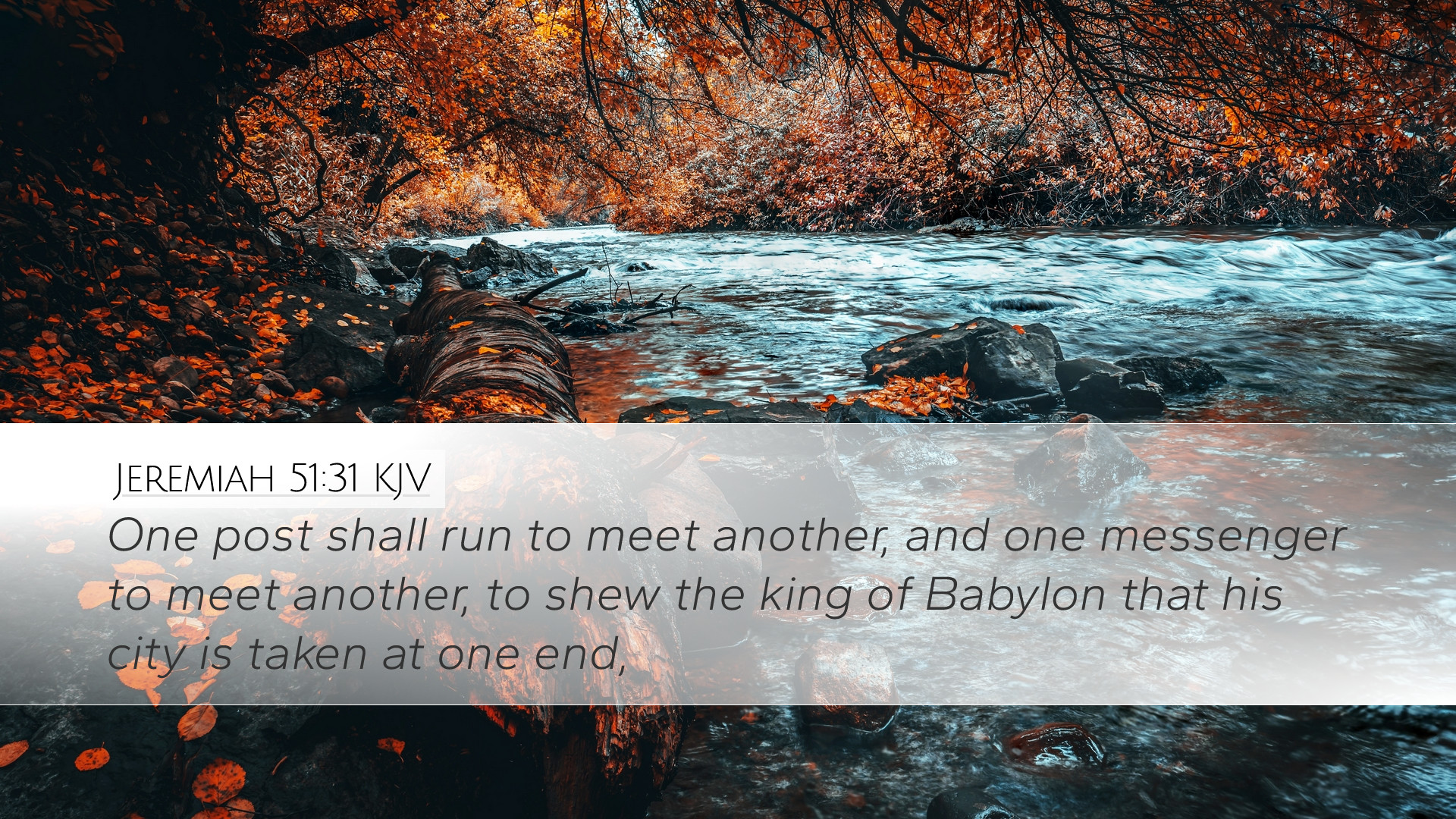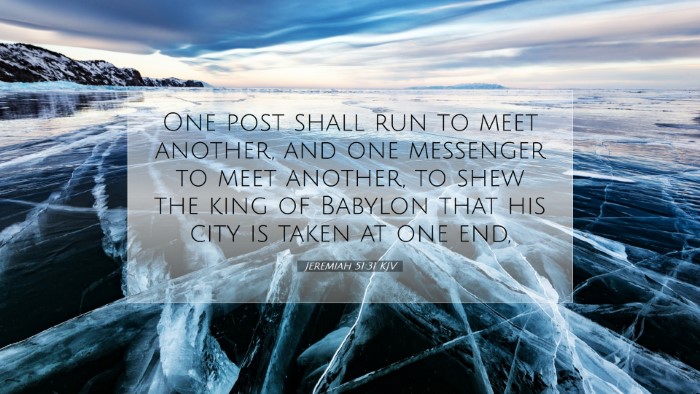Bible Commentary on Jeremiah 51:31
Verse Context: Jeremiah 51:31 states: "One runner will run to meet another, and one messenger to meet another, to show the king of Babylon that his city is taken at one end."
Overview of Jeremiah 51
The chapter 51 of Jeremiah carries a weighty prophetic message concerning the impending judgment on Babylon. It serves as part of a broader prophetic oracle against nations and emphasizes God's sovereignty over human rulers and kingdoms.
Insights from Commentaries
Matthew Henry’s Commentary
Matthew Henry emphasizes the urgency and speed with which news of Babylon's fall travels. The description of "one runner" meeting another depicts the swiftness of God's judgments and the panic that ensues from the fall of a great empire. Henry points out that this verse illustrates the collapse of a mighty power, highlighting that even the greatest of cities cannot withstand divine decrees.
Henry suggests that the runners symbolize the messengers who bring both good and bad news, drawing attention to the reality that God's judgments can come suddenly and unexpectedly. He notes that history shows the downfall of great powers serves as a reminder of God’s sovereignty.
Albert Barnes’ Notes
Albert Barnes notes the implications of Babylon's fall and its significant effects on the surrounding nations. He interprets the verse as a signal of impending doom, where messengers are sent forth to inform the king of Babylon about the calamities befalling his city. Barnes further comments that the "ends" of Babylon reflect both the geographical and metaphorical limits of the city, illustrating that the entirety of the city is vulnerable to destruction.
Barnes stresses the swiftness of communication in times of crisis, emphasizing how the news of destruction spreads quickly, echoing the idea that God's judgment will not only be felt within Babylon but will also reverberate throughout the earth.
Adam Clarke’s Commentary
Adam Clarke provides a detailed analysis of the prophetic nature of the passage. He explains that the "one runner" signifies messengers who deliver urgent news, representing God's command to announce judgment. Clarke notes the significance of the phrase "his city is taken," indicating that this news is both a fulfillment of prophecy and a testament to the authority of God over earthly kingdoms.
Clarke explores the implications of Babylon's defeat; it serves as a foreshadowing for other nations that challenge God's supremacy. He emphasizes that the runners not only share news of defeat but also highlight the futility of relying on human strength and power against divine will.
Theological Reflections
When we analyze Jeremiah 51:31 through various lenses, we are led to deep theological reflections on power, judgment, and the providence of God. The swiftness of the messengers illustrates the immediacy of God's judgment, which serves as a warning for all nations.
- God's Sovereignty: The passage reinforces the idea that no power on earth can withstand the will of God. Babylon, once a mighty empire, falls due to its idolatry and sin. This principle is applicable to contemporary nations, urging them toward humility before God.
- Prophetic Urgency: The role of messengers signifies the importance of proclaiming God's truth in our modern context. Just as the news traveled quickly in Jeremiah’s day, the importance of sharing the gospel and the call to repentance remains vital.
- Judgment and Mercy: The message also encompasses themes of judgment that carry with them opportunities for mercy. The warning of destruction serves as a call to turn back to God before judgment is realized.
Application for Today
For pastors, students, and theologians, Jeremiah 51:31 serves as a poignant reminder of the responsibility to communicate God's messages, both of warning and grace. The urgency depicted in the text challenges today's leaders to be vigilant and proactive in their faith and preaching.
As believers reflect on the significance of this chapter, they are encouraged to consider the following:
- Examine areas of life and society where human reliance may supersede trust in God.
- Strengthen resolve to share God's word with urgency, mirroring the messengers of old.
- Recognize the continuous relevance of prophetic messages and their implications for personal and community faith.
In conclusion, Jeremiah 51:31 reminds us of God's ultimate authority over nations and individuals, urging action, reflection, and reliance on divine providence amidst the uncertainties of life.


